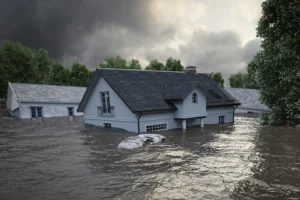When disaster strikes, the clock starts ticking on its potential impact on your property’s value. As experts in property damage restoration in Mukilteo, WA, we understand the urgency and the necessity of prompt action. Immediate restoration mitigates further damage and plays a crucial role in preserving the market value of your property. Every minute that passes can mean more than just physical damage; it can also translate to a significant depreciation in your property’s potential resale value.
We’ve seen firsthand how timely intervention can make all the difference. Our experience in handling property restoration shows that quick and efficient response helps maintain structural integrity and can significantly boost a property’s market appeal. On the other hand, delays in addressing issues can lead to long-term problems that are often much costlier to resolve. Through this article, we aim to highlight the critical importance of acting swiftly when it comes to restoration and how doing so can help maintain, if not increase, your property’s value in the market. Let’s explore what makes timely restoration so crucial and how it can benefit you in the long run.
How Delayed Restoration Affects Your Property’s Market Value
When property damage is left unaddressed, the effects can extend far beyond the immediate physical destruction. The longer the restoration process is delayed, the greater the risk of intense secondary damage, such as mold growth, structural instability, and other deteriorations that significantly decrease your property’s market value. We observe this regularly—properties that receive immediate attention retain higher value compared to those where restoration is postponed.
The chain reaction starts with the visible wear and tear and extends to deeper, possibly irreversible issues. Moisture from water damage, for example, can seep into sheetrock and wooden beams, causing them to weaken over time. This could compromise your property’s structural integrity, turning a straightforward repair into a complex, expensive rehabilitation project. Thus, a quick response is not just crucial; it’s a financial safeguard for your investment.
Key Elements of Timely Restoration Services
Specific elements of the restoration process must be executed in a timely manner to maintain the market value of your property after damage. The first step in our approach involves rapid response and assessment. Our team is trained to act swiftly to evaluate the extent of damage and plan the most effective strategy for mitigation and repair. This immediate action is crucial to prevent further damage and start the restoration process as quickly as possible.
Secondly, utilizing the latest technology and techniques is vital. We employ advanced equipment for water extraction, drying, dehumidifying, and sanitizing—all aimed at speeding up the recovery process while ensuring high-quality outcomes. Each tool and technique we implement is chosen to mitigate damage efficiently and restore properties to their pre-disaster states or better. This use of state-of-the-art technology not only expedites the restoration process but also ensures that every aspect of damage is thoroughly addressed, thereby maintaining your property’s structural integrity and aesthetic value.
The Economic Impact of Restoration on Property Resale Value
Restoring your property promptly after damage repairs the physical structure and significantly influences its economic standing in the market. We’ve observed that properties restored without delay tend to retain or increase their market value, whereas those left untreated depreciate quickly. Quick and effective restoration reassures potential buyers about the health and longevity of the property, making it a more attractive investment.
Economic benefits of timely restoration include avoiding the steep costs associated with long-term damages that become harder and more expensive to fix over time. Additionally, restored properties often meet current market expectations for safety and design, boosting the property’s appeal and potentially its listing price. Simply put, investing in rapid restoration can translate into higher financial returns if you sell your home.
Simple Maintenance Tips to Prevent Major Damage
Regular maintenance is key to helping prevent major property damage and the need for extensive restoration. We suggest creating a schedule that includes routine checks and upkeep throughout the year. For instance, regularly cleaning gutters and downspouts can prevent water damage, while inspecting roofs and foundations can catch issues before they escalate.
Here are some easy-to-implement tips:
- Keep an eye on water-sensitive areas like bathrooms and kitchens for any signs of leaks or mold.
- Check seals around windows and doors to ensure no gaps might let in water during a storm.
- Trim trees close to your home to prevent limbs from breaking off and damaging the roof or structure during high winds.
- Regularly inspect your heating, ventilation, and air conditioning systems to ensure they are functioning correctly, as these can cause water damage if they malfunction.
By undertaking these simple actions, you can greatly reduce the risk of significant damage to your property and avoid the stress and cost of emergency restorations.
Protecting Your Property’s Value Through Expert Restoration
Understanding the urgency and effects of immediate property restoration helps keep your home safe and secures its value in the real estate market. As leading experts in property restoration in Mukilteo, WA, our team is dedicated to providing rapid, efficient service to ensure your property does not suffer from decreased value due to preventable damage.
If you’re facing property damage or need maintenance tips to safeguard your investment, don’t hesitate to reach out. At Northwest Restoration, we’re here to offer our expertise and help you protect and enhance the value of your property through professional restoration services. Remember, taking action at the right time can make a significant difference. Contact us today to help you keep your property in prime condition.









